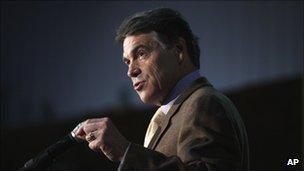When is a gaffe not a gaffe?
- Published
- comments
As the Republican primaries heat up I can predict one thing: We'll have plenty of headlines about "gaffes", external.
It is a word I treat with some caution. Not that politicians don't make "social or diplomatic blunders" or "noticeable mistakes", external. But often the blunder is in the eye of the beholder.

Fightin' words: Mr Perry warned Mr Bernanke would get "ugly" treatment in Texas
Don't get me wrong. I am all in favour of highlighting controversial statements by candidates, reporting on the reaction and indeed adding opinion when appropriate.
I am just against the glib labelling of anything questionable as a "gaffe". To do so can impose an orthodoxy and makes assumptions about the legitimate bounds of debate.
Moreover, it throws the same blanket of disapproval over quite different cases, from genuine mistakes to deliberate if provocative statements.
Michele Bachmann's latest pronouncement that has been labelled a gaffe is pretty close to the dictionary definition.
She got a date wrong. She wished Elvis a happy birthday on the anniversary of his death. It is utterly trivial. Who cares? Well, those who argue she's sloppy with the facts. It feeds into a narrative.
But Ryan Lizza in the New Yorker, external makes a convincing argument that other Bachmann statements which have been labelled gaffes - such as arguing that the founding fathers fought against slavery - are the reflection of her world view, not factual mistakes. You might not like that world view, but beyond derision there is a debate to be had.
An even sharper example is Rick Perry's suggestion, external that if Federal Reserve Chairman Ben Bernanke printed more money it would be close to treason.
It is a highly questionable statement. It labels a conventional policy Mr Perry disagrees with as criminal and unpatriotic, indeed punishable by death. It suggests that as president, Mr Perry would not respect the Fed's traditional independence., external
So it's extremely controversial.
But it's only a gaffe to those who disagree: many conservatives will nod their head in approval at the sentiments behind the strong words., external And let's face it, the harsh rhetoric got him headlines when "I think printing money is bad for the economy" might not have made a single column inch.
Then there is the artfully imagined gaffe. Mr Perry referred to a "big black cloud" hanging over America. He was attacked (even by Fox News, external, usually friendly towards conservatives) for making a racist remark about the president, external.
In fact his words were taken out of context, as he was referring to the national debt.
More than that, it is beyond prissy to object to a common turn of phrase. This really is an example of opponents and journalists in search of a story making out that a hum-drum remark was a huge blunder.
There is every reason to scrutinise the factual accuracy, the language and the pronouncements of candidates in the greatest detail, and to invite their opponents to criticise them.
We should not let the doubtful or controversial pass without comment. But unless it's a real gaffe, let's save it for the type that's used to hook fish, external.